Psychological Need Assessment by Nurses in Emergency Situations
VerifiedAdded on 2023/04/07
|12
|1142
|379
Presentation
AI Summary
This presentation is a research proposal focusing on the critical role of nurses in assessing the psychological needs of survivors during emergency and disaster situations. It emphasizes the devastating impact of disasters, both natural and man-made, on the mental stability of affected individuals and the necessity of providing mental health assistance alongside physical treatment. The presentation delves into the history of disaster management, the specific needs of survivors, and the crucial role nurses play in all phases of disaster management, including preparedness, response, recovery, and mitigation. A comprehensive literature review highlights the prevalence of depression, grief, and potential suicidal thoughts among survivors, underscoring the importance of psychological intervention. The research aims to identify the need for psychological assessment of disaster survivors and the role of nurses in empowering their mental health during recovery. A qualitative research method will be used, with interviews of nurses from Australian healthcare organizations. The presentation outlines the data analysis process, ethical considerations, and future recommendations, and includes a comprehensive list of cited works.
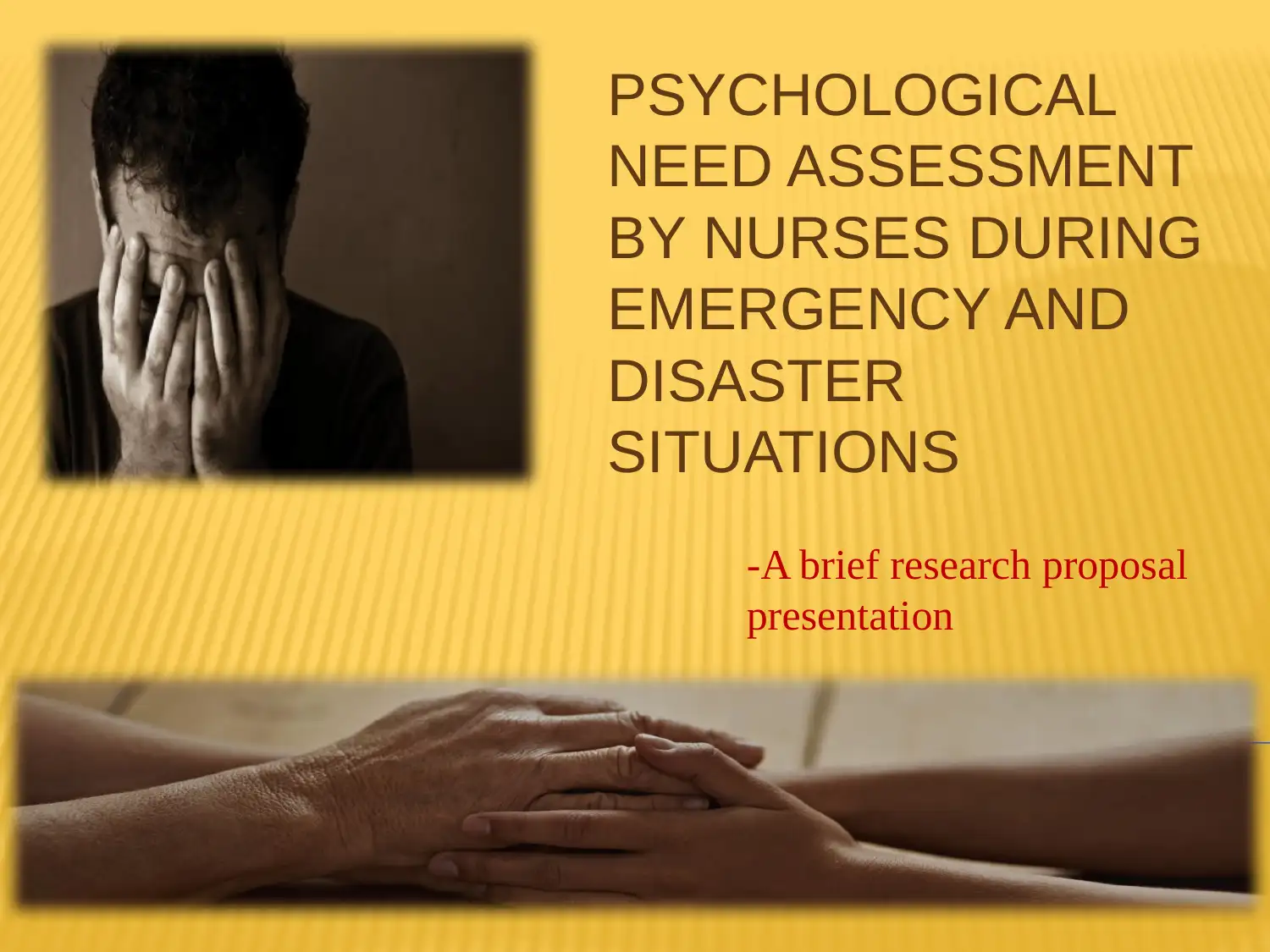
PSYCHOLOGICAL
NEED ASSESSMENT
BY NURSES DURING
EMERGENCY AND
DISASTER
SITUATIONS
-A brief research proposal
presentation
NEED ASSESSMENT
BY NURSES DURING
EMERGENCY AND
DISASTER
SITUATIONS
-A brief research proposal
presentation
Paraphrase This Document
Need a fresh take? Get an instant paraphrase of this document with our AI Paraphraser
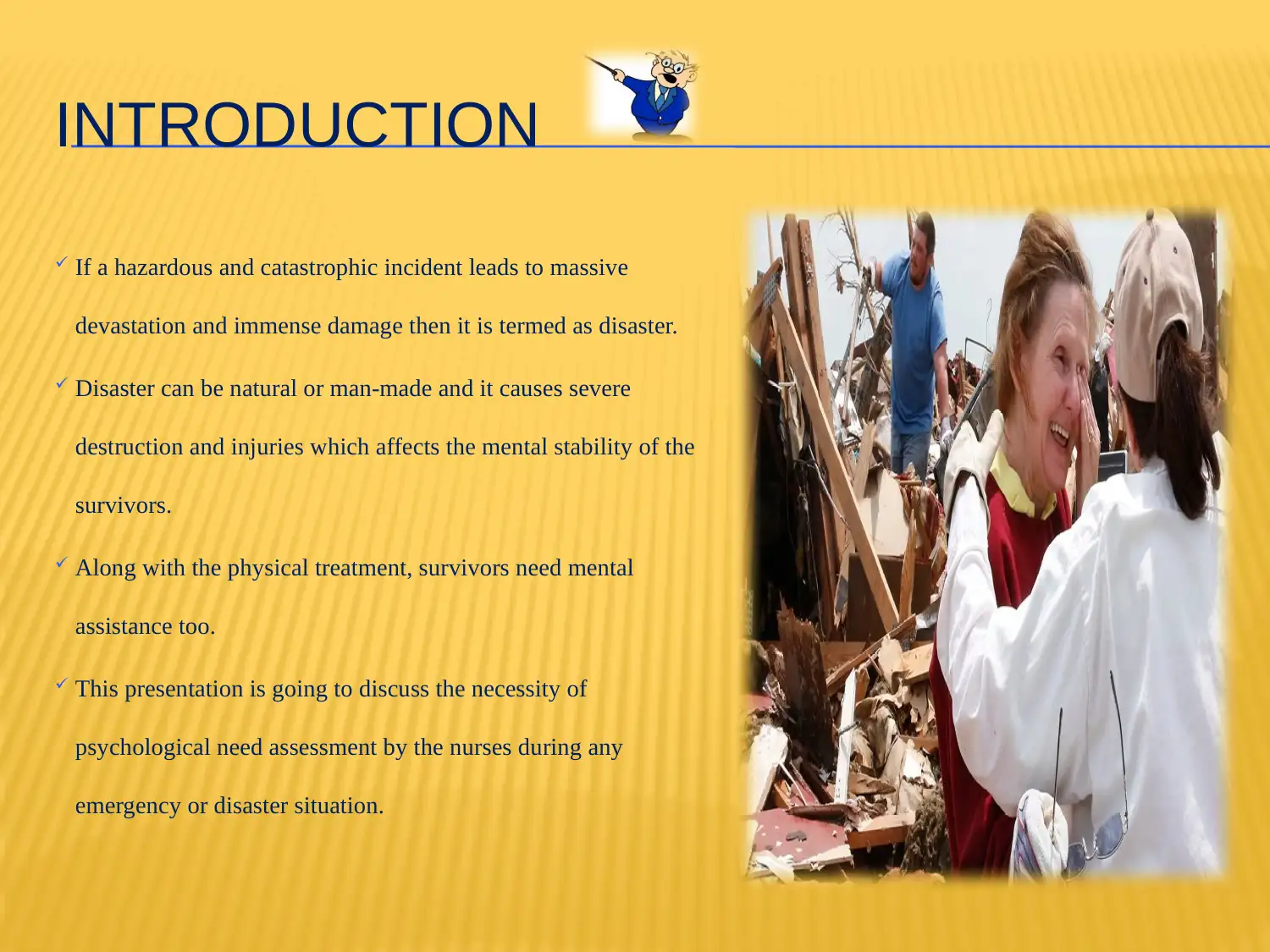
INTRODUCTION
If a hazardous and catastrophic incident leads to massive
devastation and immense damage then it is termed as disaster.
Disaster can be natural or man-made and it causes severe
destruction and injuries which affects the mental stability of the
survivors.
Along with the physical treatment, survivors need mental
assistance too.
This presentation is going to discuss the necessity of
psychological need assessment by the nurses during any
emergency or disaster situation.
If a hazardous and catastrophic incident leads to massive
devastation and immense damage then it is termed as disaster.
Disaster can be natural or man-made and it causes severe
destruction and injuries which affects the mental stability of the
survivors.
Along with the physical treatment, survivors need mental
assistance too.
This presentation is going to discuss the necessity of
psychological need assessment by the nurses during any
emergency or disaster situation.
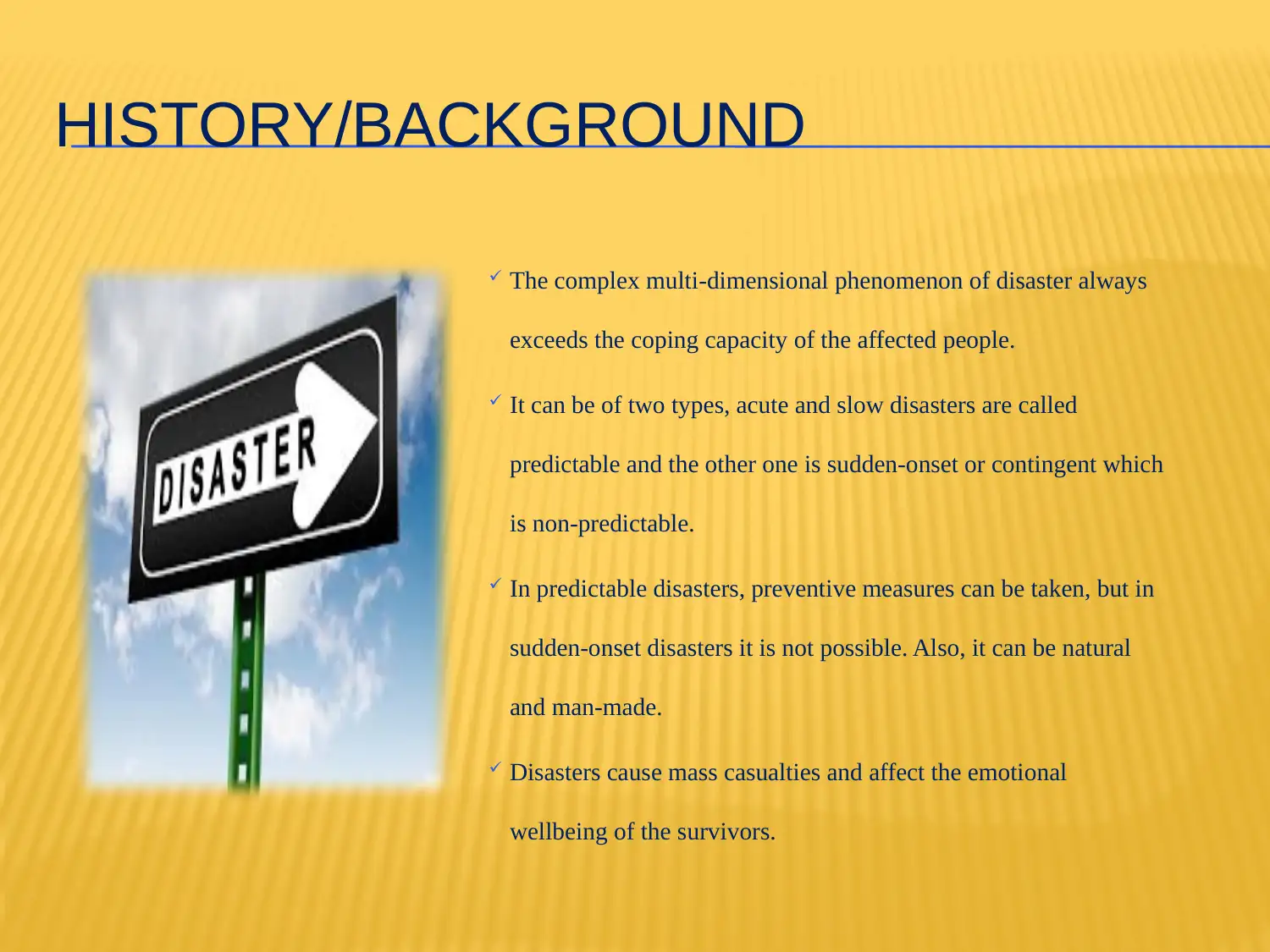
HISTORY/BACKGROUND
The complex multi-dimensional phenomenon of disaster always
exceeds the coping capacity of the affected people.
It can be of two types, acute and slow disasters are called
predictable and the other one is sudden-onset or contingent which
is non-predictable.
In predictable disasters, preventive measures can be taken, but in
sudden-onset disasters it is not possible. Also, it can be natural
and man-made.
Disasters cause mass casualties and affect the emotional
wellbeing of the survivors.
The complex multi-dimensional phenomenon of disaster always
exceeds the coping capacity of the affected people.
It can be of two types, acute and slow disasters are called
predictable and the other one is sudden-onset or contingent which
is non-predictable.
In predictable disasters, preventive measures can be taken, but in
sudden-onset disasters it is not possible. Also, it can be natural
and man-made.
Disasters cause mass casualties and affect the emotional
wellbeing of the survivors.
⊘ This is a preview!⊘
Do you want full access?
Subscribe today to unlock all pages.

Trusted by 1+ million students worldwide
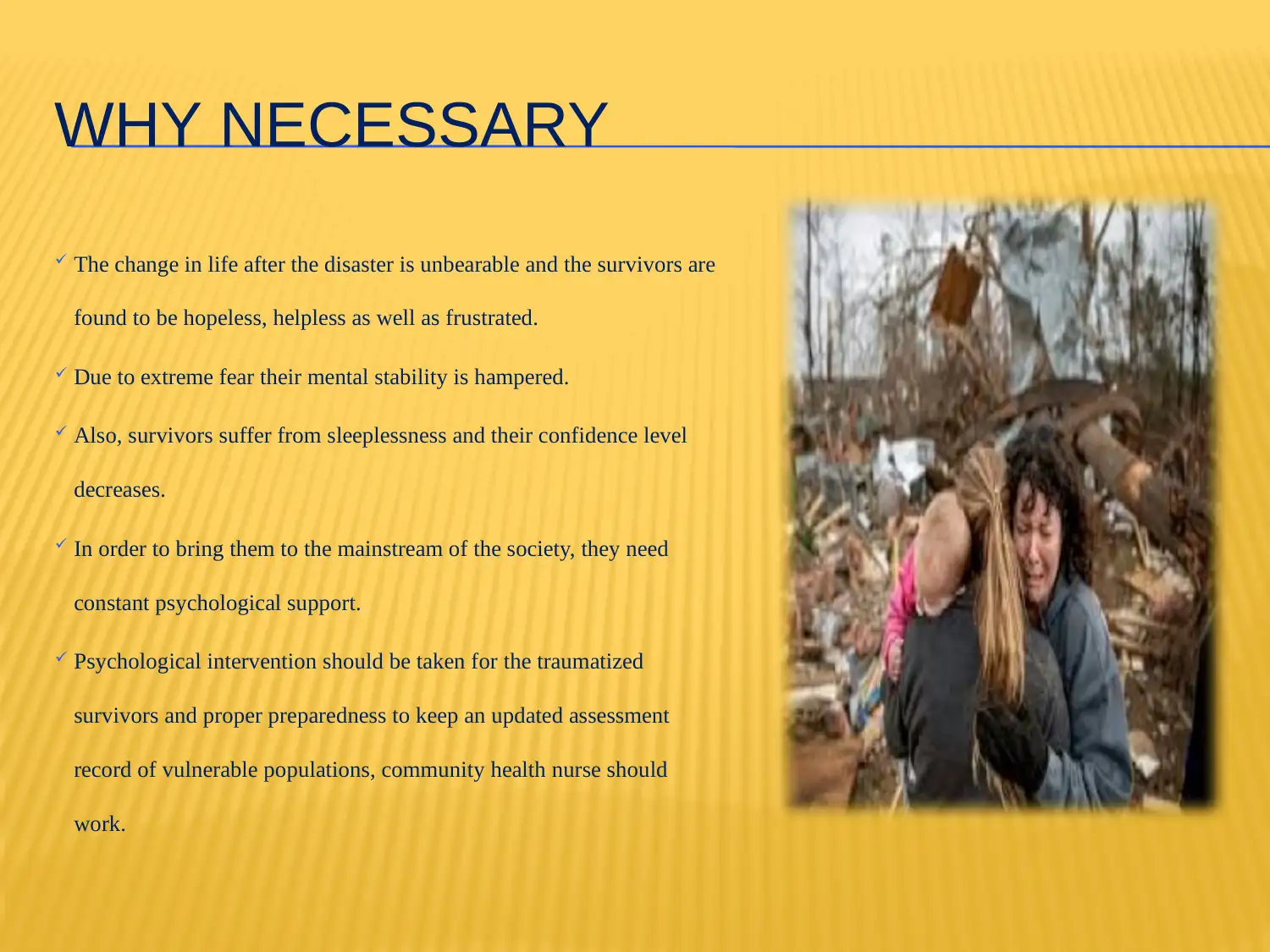
WHY NECESSARY
The change in life after the disaster is unbearable and the survivors are
found to be hopeless, helpless as well as frustrated.
Due to extreme fear their mental stability is hampered.
Also, survivors suffer from sleeplessness and their confidence level
decreases.
In order to bring them to the mainstream of the society, they need
constant psychological support.
Psychological intervention should be taken for the traumatized
survivors and proper preparedness to keep an updated assessment
record of vulnerable populations, community health nurse should
work.
The change in life after the disaster is unbearable and the survivors are
found to be hopeless, helpless as well as frustrated.
Due to extreme fear their mental stability is hampered.
Also, survivors suffer from sleeplessness and their confidence level
decreases.
In order to bring them to the mainstream of the society, they need
constant psychological support.
Psychological intervention should be taken for the traumatized
survivors and proper preparedness to keep an updated assessment
record of vulnerable populations, community health nurse should
work.
Paraphrase This Document
Need a fresh take? Get an instant paraphrase of this document with our AI Paraphraser
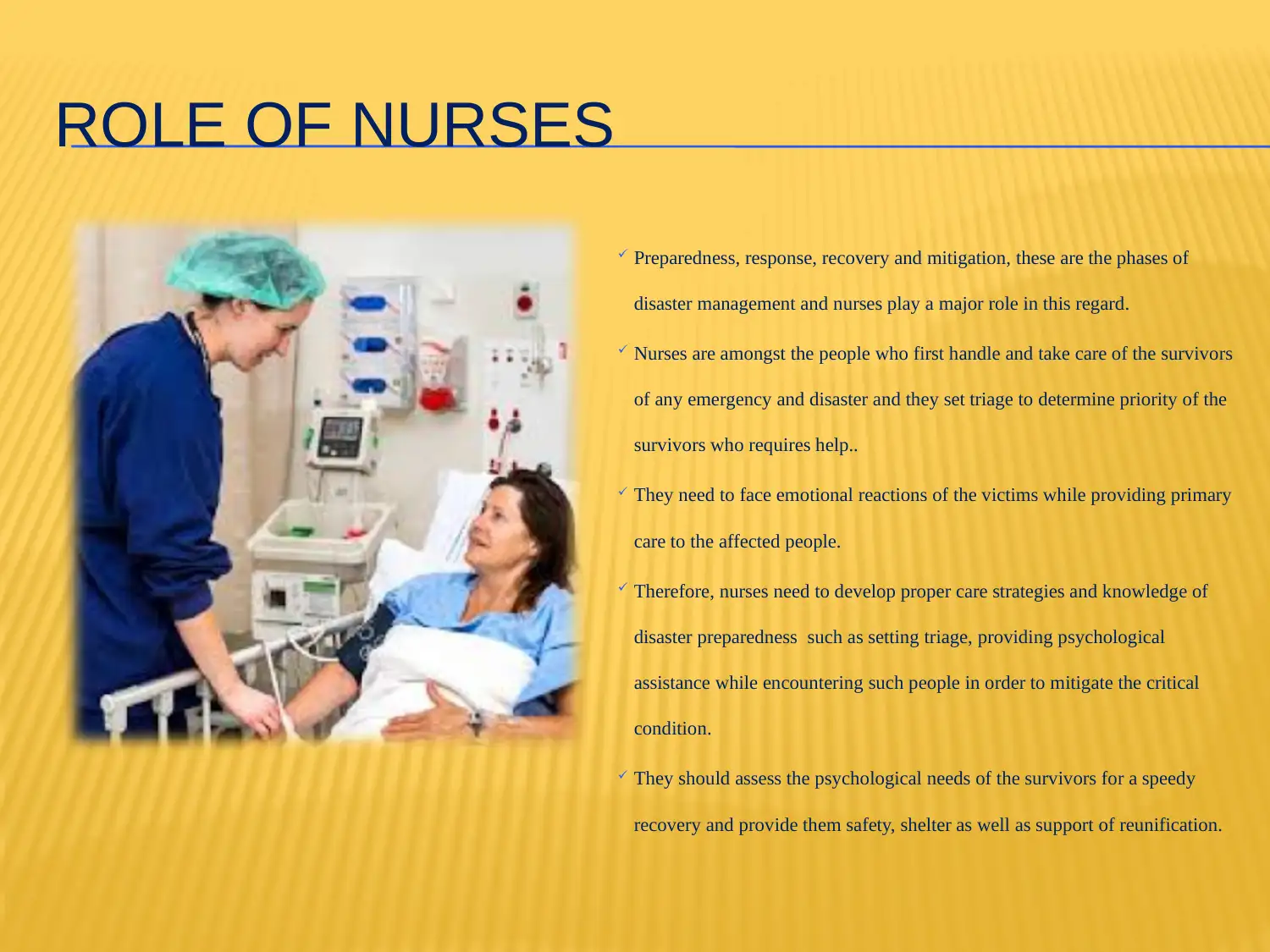
ROLE OF NURSES
Preparedness, response, recovery and mitigation, these are the phases of
disaster management and nurses play a major role in this regard.
Nurses are amongst the people who first handle and take care of the survivors
of any emergency and disaster and they set triage to determine priority of the
survivors who requires help..
They need to face emotional reactions of the victims while providing primary
care to the affected people.
Therefore, nurses need to develop proper care strategies and knowledge of
disaster preparedness such as setting triage, providing psychological
assistance while encountering such people in order to mitigate the critical
condition.
They should assess the psychological needs of the survivors for a speedy
recovery and provide them safety, shelter as well as support of reunification.
Preparedness, response, recovery and mitigation, these are the phases of
disaster management and nurses play a major role in this regard.
Nurses are amongst the people who first handle and take care of the survivors
of any emergency and disaster and they set triage to determine priority of the
survivors who requires help..
They need to face emotional reactions of the victims while providing primary
care to the affected people.
Therefore, nurses need to develop proper care strategies and knowledge of
disaster preparedness such as setting triage, providing psychological
assistance while encountering such people in order to mitigate the critical
condition.
They should assess the psychological needs of the survivors for a speedy
recovery and provide them safety, shelter as well as support of reunification.
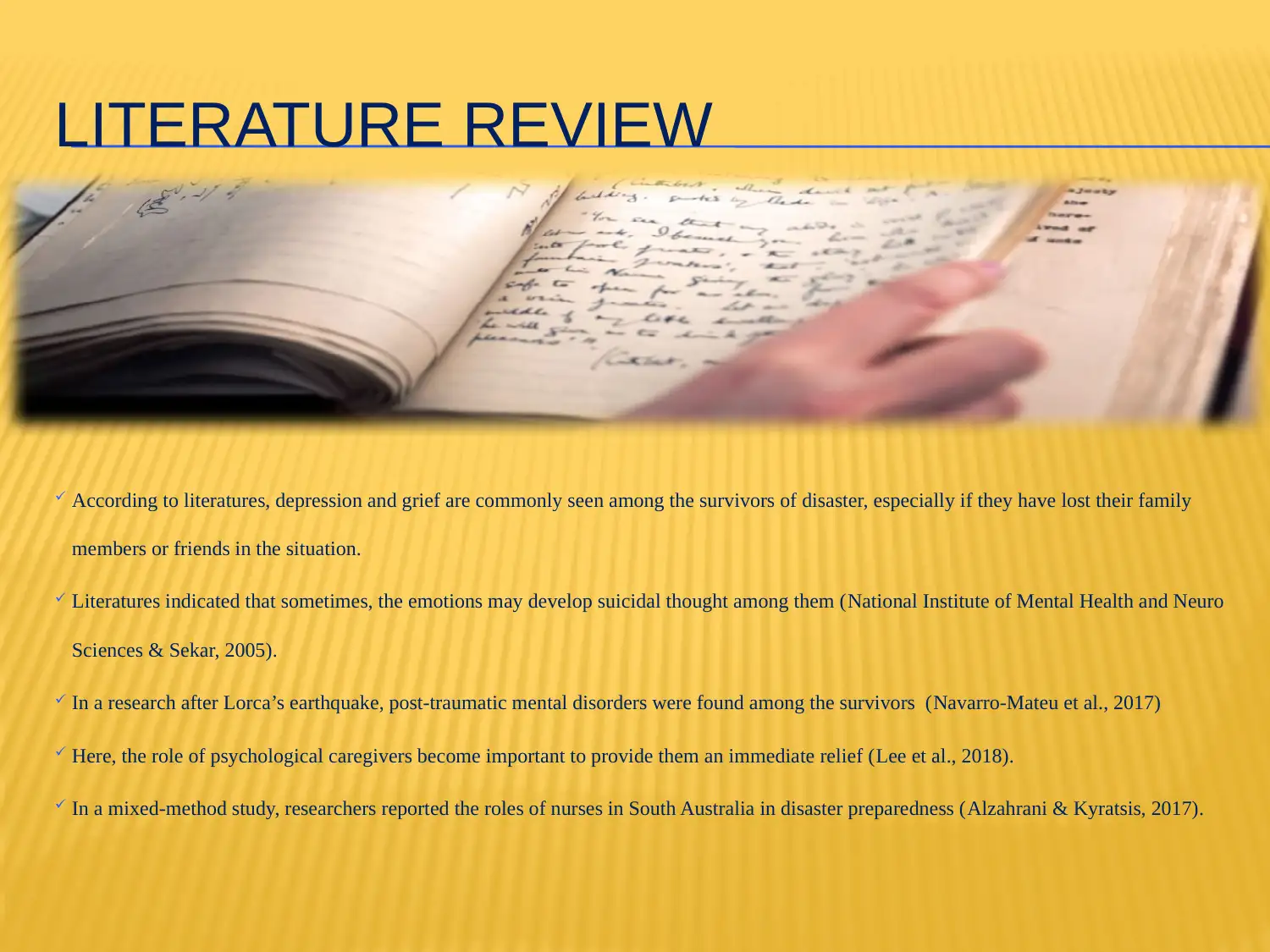
LITERATURE REVIEW
According to literatures, depression and grief are commonly seen among the survivors of disaster, especially if they have lost their family
members or friends in the situation.
Literatures indicated that sometimes, the emotions may develop suicidal thought among them (National Institute of Mental Health and Neuro
Sciences & Sekar, 2005).
In a research after Lorca’s earthquake, post-traumatic mental disorders were found among the survivors (Navarro-Mateu et al., 2017)
Here, the role of psychological caregivers become important to provide them an immediate relief (Lee et al., 2018).
In a mixed-method study, researchers reported the roles of nurses in South Australia in disaster preparedness (Alzahrani & Kyratsis, 2017).
According to literatures, depression and grief are commonly seen among the survivors of disaster, especially if they have lost their family
members or friends in the situation.
Literatures indicated that sometimes, the emotions may develop suicidal thought among them (National Institute of Mental Health and Neuro
Sciences & Sekar, 2005).
In a research after Lorca’s earthquake, post-traumatic mental disorders were found among the survivors (Navarro-Mateu et al., 2017)
Here, the role of psychological caregivers become important to provide them an immediate relief (Lee et al., 2018).
In a mixed-method study, researchers reported the roles of nurses in South Australia in disaster preparedness (Alzahrani & Kyratsis, 2017).
⊘ This is a preview!⊘
Do you want full access?
Subscribe today to unlock all pages.

Trusted by 1+ million students worldwide
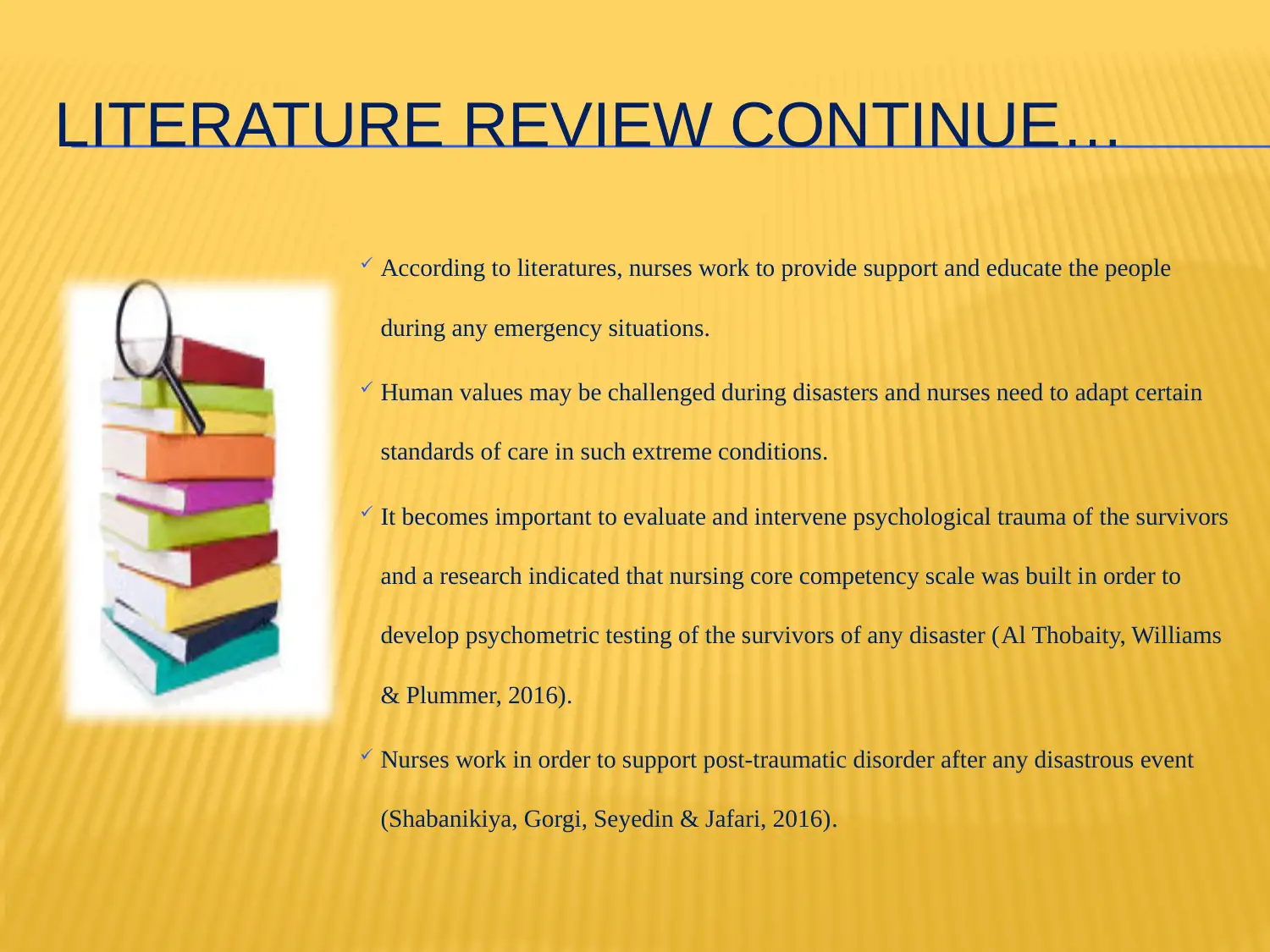
LITERATURE REVIEW CONTINUE…
According to literatures, nurses work to provide support and educate the people
during any emergency situations.
Human values may be challenged during disasters and nurses need to adapt certain
standards of care in such extreme conditions.
It becomes important to evaluate and intervene psychological trauma of the survivors
and a research indicated that nursing core competency scale was built in order to
develop psychometric testing of the survivors of any disaster (Al Thobaity, Williams
& Plummer, 2016).
Nurses work in order to support post-traumatic disorder after any disastrous event
(Shabanikiya, Gorgi, Seyedin & Jafari, 2016).
According to literatures, nurses work to provide support and educate the people
during any emergency situations.
Human values may be challenged during disasters and nurses need to adapt certain
standards of care in such extreme conditions.
It becomes important to evaluate and intervene psychological trauma of the survivors
and a research indicated that nursing core competency scale was built in order to
develop psychometric testing of the survivors of any disaster (Al Thobaity, Williams
& Plummer, 2016).
Nurses work in order to support post-traumatic disorder after any disastrous event
(Shabanikiya, Gorgi, Seyedin & Jafari, 2016).
Paraphrase This Document
Need a fresh take? Get an instant paraphrase of this document with our AI Paraphraser
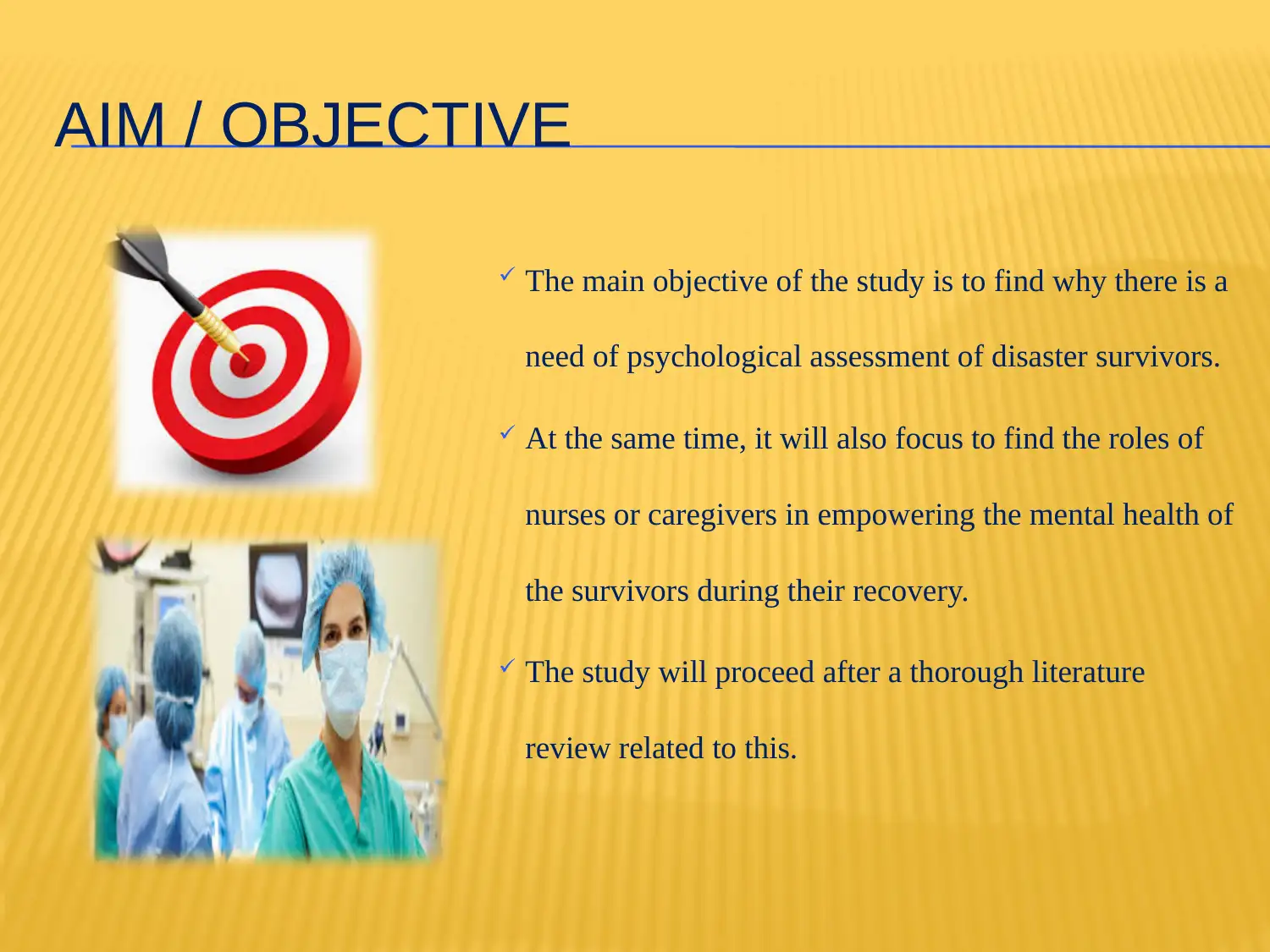
AIM / OBJECTIVE
The main objective of the study is to find why there is a
need of psychological assessment of disaster survivors.
At the same time, it will also focus to find the roles of
nurses or caregivers in empowering the mental health of
the survivors during their recovery.
The study will proceed after a thorough literature
review related to this.
The main objective of the study is to find why there is a
need of psychological assessment of disaster survivors.
At the same time, it will also focus to find the roles of
nurses or caregivers in empowering the mental health of
the survivors during their recovery.
The study will proceed after a thorough literature
review related to this.
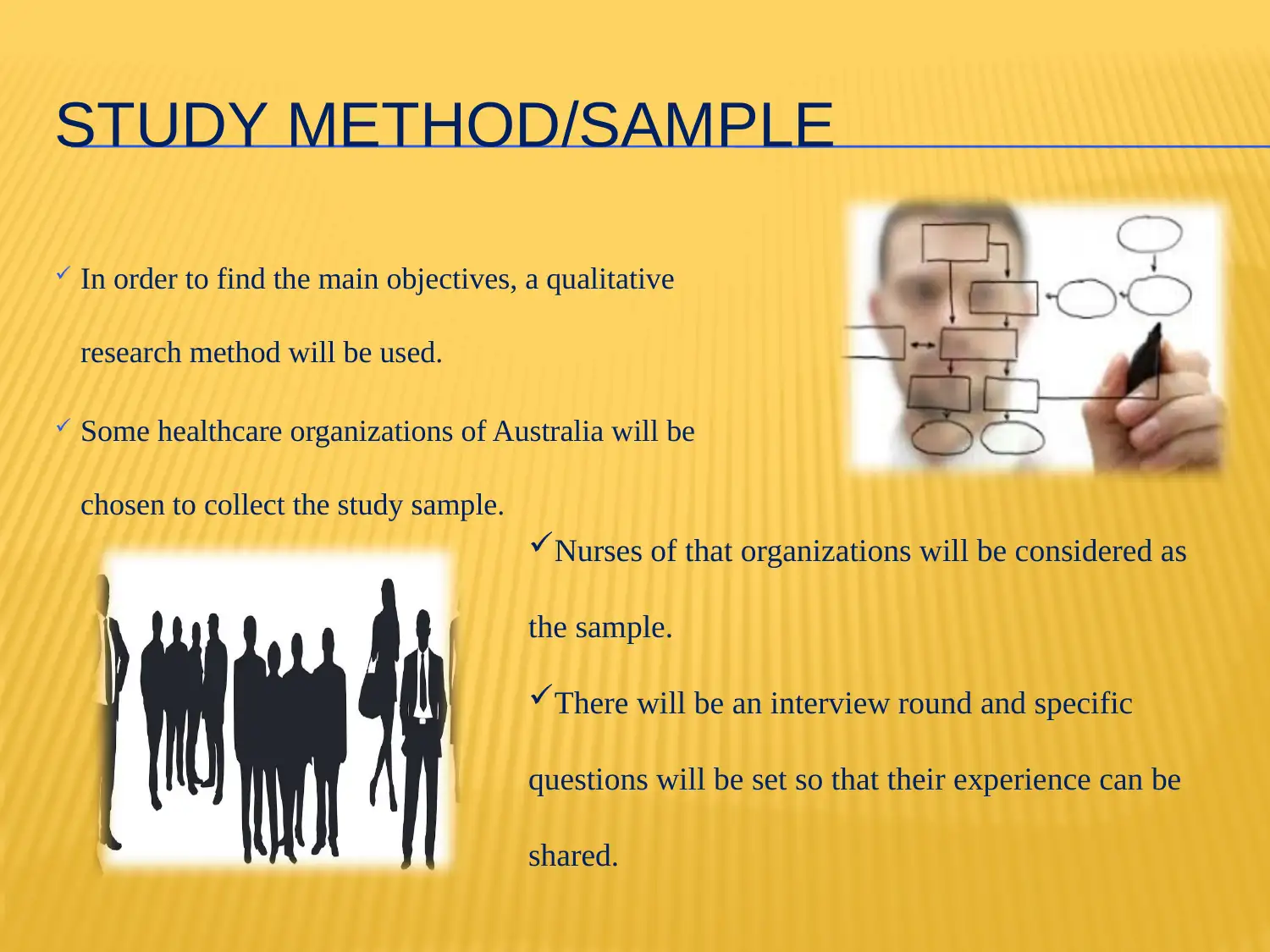
STUDY METHOD/SAMPLE
In order to find the main objectives, a qualitative
research method will be used.
Some healthcare organizations of Australia will be
chosen to collect the study sample.
Nurses of that organizations will be considered as
the sample.
There will be an interview round and specific
questions will be set so that their experience can be
shared.
In order to find the main objectives, a qualitative
research method will be used.
Some healthcare organizations of Australia will be
chosen to collect the study sample.
Nurses of that organizations will be considered as
the sample.
There will be an interview round and specific
questions will be set so that their experience can be
shared.
⊘ This is a preview!⊘
Do you want full access?
Subscribe today to unlock all pages.

Trusted by 1+ million students worldwide

FINDINGS AND ANALYSIS
Data analysis is the most complex and
mysterious phase of qualitative research
method.
After the collection of the data, there will be
a computer-based coding.
NVivo is a computer-based qualitative data analysis software
which will be used to analyze the data collected in the form
of code.
This software is designed in order to integrate the coding
(Zamawe, 2015).
Data analysis is the most complex and
mysterious phase of qualitative research
method.
After the collection of the data, there will be
a computer-based coding.
NVivo is a computer-based qualitative data analysis software
which will be used to analyze the data collected in the form
of code.
This software is designed in order to integrate the coding
(Zamawe, 2015).
Paraphrase This Document
Need a fresh take? Get an instant paraphrase of this document with our AI Paraphraser
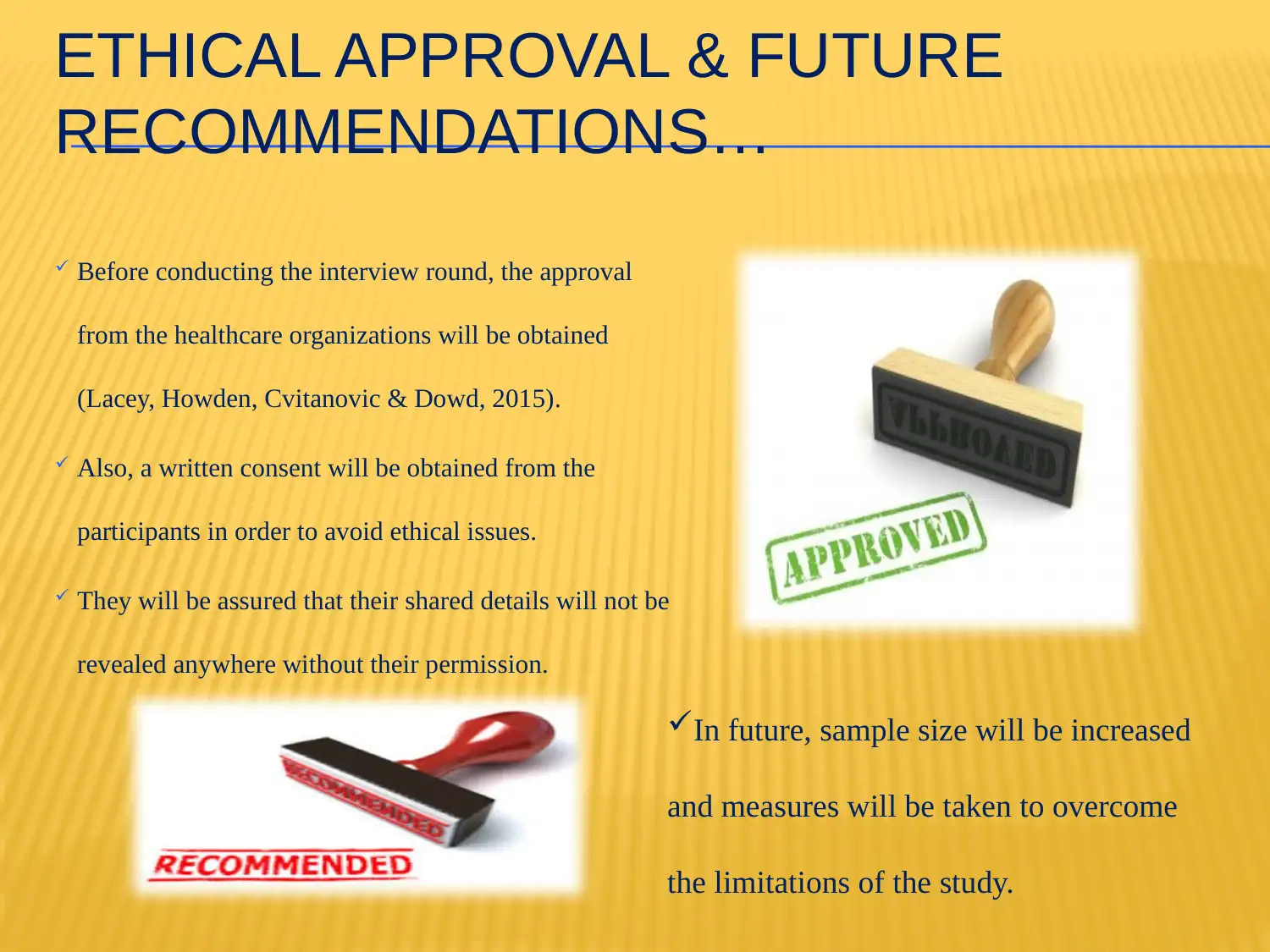
ETHICAL APPROVAL & FUTURE
RECOMMENDATIONS…
Before conducting the interview round, the approval
from the healthcare organizations will be obtained
(Lacey, Howden, Cvitanovic & Dowd, 2015).
Also, a written consent will be obtained from the
participants in order to avoid ethical issues.
They will be assured that their shared details will not be
revealed anywhere without their permission.
In future, sample size will be increased
and measures will be taken to overcome
the limitations of the study.
RECOMMENDATIONS…
Before conducting the interview round, the approval
from the healthcare organizations will be obtained
(Lacey, Howden, Cvitanovic & Dowd, 2015).
Also, a written consent will be obtained from the
participants in order to avoid ethical issues.
They will be assured that their shared details will not be
revealed anywhere without their permission.
In future, sample size will be increased
and measures will be taken to overcome
the limitations of the study.
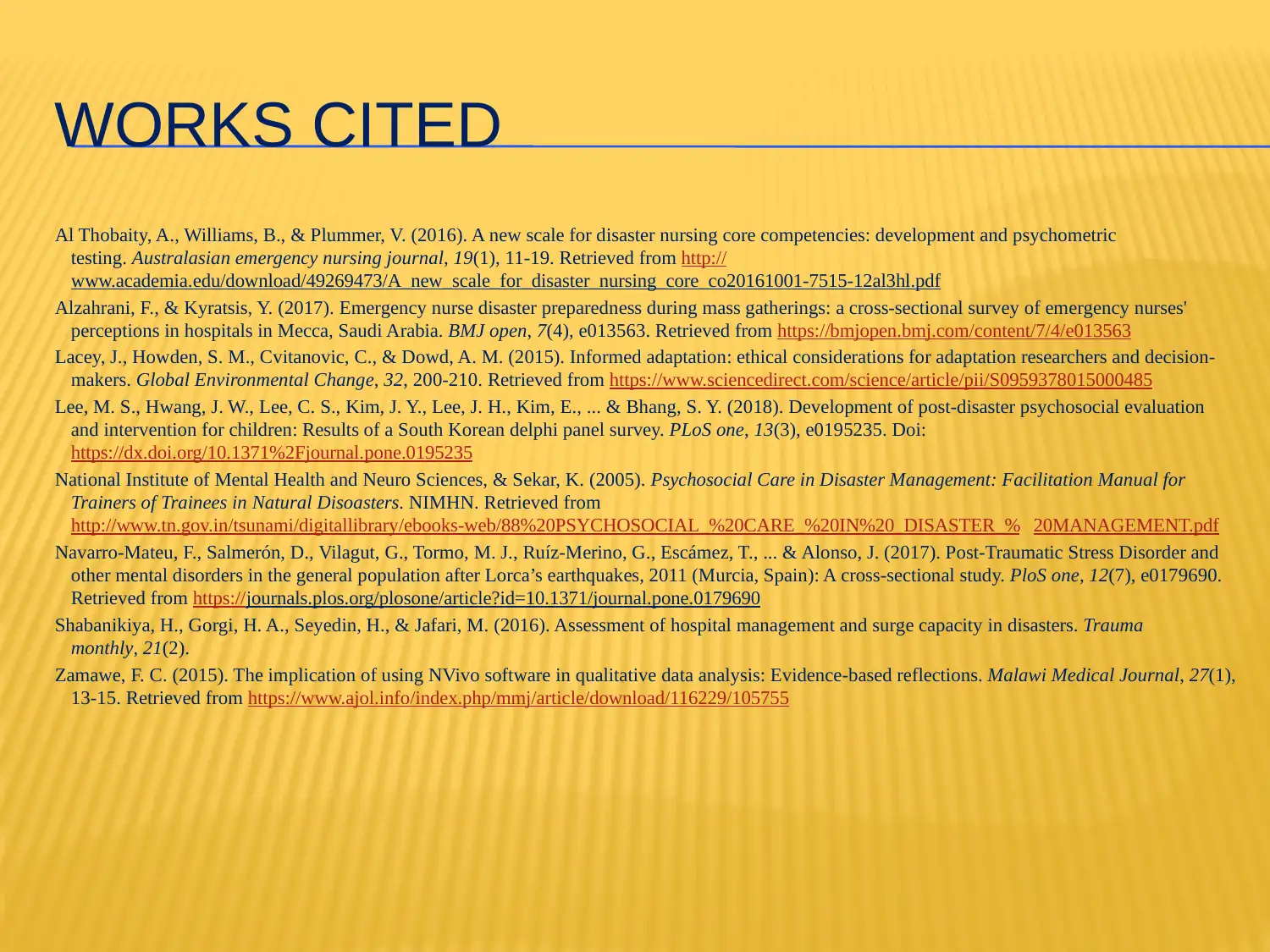
WORKS CITED
Al Thobaity, A., Williams, B., & Plummer, V. (2016). A new scale for disaster nursing core competencies: development and psychometric
testing. Australasian emergency nursing journal, 19(1), 11-19. Retrieved from http://
www.academia.edu/download/49269473/A_new_scale_for_disaster_nursing_core_co20161001-7515-12al3hl.pdf
Alzahrani, F., & Kyratsis, Y. (2017). Emergency nurse disaster preparedness during mass gatherings: a cross-sectional survey of emergency nurses'
perceptions in hospitals in Mecca, Saudi Arabia. BMJ open, 7(4), e013563. Retrieved from https://bmjopen.bmj.com/content/7/4/e013563
Lacey, J., Howden, S. M., Cvitanovic, C., & Dowd, A. M. (2015). Informed adaptation: ethical considerations for adaptation researchers and decision-
makers. Global Environmental Change, 32, 200-210. Retrieved from https://www.sciencedirect.com/science/article/pii/S0959378015000485
Lee, M. S., Hwang, J. W., Lee, C. S., Kim, J. Y., Lee, J. H., Kim, E., ... & Bhang, S. Y. (2018). Development of post-disaster psychosocial evaluation
and intervention for children: Results of a South Korean delphi panel survey. PLoS one, 13(3), e0195235. Doi:
https://dx.doi.org/10.1371%2Fjournal.pone.0195235
National Institute of Mental Health and Neuro Sciences, & Sekar, K. (2005). Psychosocial Care in Disaster Management: Facilitation Manual for
Trainers of Trainees in Natural Disoasters. NIMHN. Retrieved from
http://www.tn.gov.in/tsunami/digitallibrary/ebooks-web/88%20PSYCHOSOCIAL_%20CARE_%20IN%20_DISASTER_% 20MANAGEMENT.pdf
Navarro-Mateu, F., Salmerón, D., Vilagut, G., Tormo, M. J., Ruíz-Merino, G., Escámez, T., ... & Alonso, J. (2017). Post-Traumatic Stress Disorder and
other mental disorders in the general population after Lorca’s earthquakes, 2011 (Murcia, Spain): A cross-sectional study. PloS one, 12(7), e0179690.
Retrieved from https://journals.plos.org/plosone/article?id=10.1371/journal.pone.0179690
Shabanikiya, H., Gorgi, H. A., Seyedin, H., & Jafari, M. (2016). Assessment of hospital management and surge capacity in disasters. Trauma
monthly, 21(2).
Zamawe, F. C. (2015). The implication of using NVivo software in qualitative data analysis: Evidence-based reflections. Malawi Medical Journal, 27(1),
13-15. Retrieved from https://www.ajol.info/index.php/mmj/article/download/116229/105755
Al Thobaity, A., Williams, B., & Plummer, V. (2016). A new scale for disaster nursing core competencies: development and psychometric
testing. Australasian emergency nursing journal, 19(1), 11-19. Retrieved from http://
www.academia.edu/download/49269473/A_new_scale_for_disaster_nursing_core_co20161001-7515-12al3hl.pdf
Alzahrani, F., & Kyratsis, Y. (2017). Emergency nurse disaster preparedness during mass gatherings: a cross-sectional survey of emergency nurses'
perceptions in hospitals in Mecca, Saudi Arabia. BMJ open, 7(4), e013563. Retrieved from https://bmjopen.bmj.com/content/7/4/e013563
Lacey, J., Howden, S. M., Cvitanovic, C., & Dowd, A. M. (2015). Informed adaptation: ethical considerations for adaptation researchers and decision-
makers. Global Environmental Change, 32, 200-210. Retrieved from https://www.sciencedirect.com/science/article/pii/S0959378015000485
Lee, M. S., Hwang, J. W., Lee, C. S., Kim, J. Y., Lee, J. H., Kim, E., ... & Bhang, S. Y. (2018). Development of post-disaster psychosocial evaluation
and intervention for children: Results of a South Korean delphi panel survey. PLoS one, 13(3), e0195235. Doi:
https://dx.doi.org/10.1371%2Fjournal.pone.0195235
National Institute of Mental Health and Neuro Sciences, & Sekar, K. (2005). Psychosocial Care in Disaster Management: Facilitation Manual for
Trainers of Trainees in Natural Disoasters. NIMHN. Retrieved from
http://www.tn.gov.in/tsunami/digitallibrary/ebooks-web/88%20PSYCHOSOCIAL_%20CARE_%20IN%20_DISASTER_% 20MANAGEMENT.pdf
Navarro-Mateu, F., Salmerón, D., Vilagut, G., Tormo, M. J., Ruíz-Merino, G., Escámez, T., ... & Alonso, J. (2017). Post-Traumatic Stress Disorder and
other mental disorders in the general population after Lorca’s earthquakes, 2011 (Murcia, Spain): A cross-sectional study. PloS one, 12(7), e0179690.
Retrieved from https://journals.plos.org/plosone/article?id=10.1371/journal.pone.0179690
Shabanikiya, H., Gorgi, H. A., Seyedin, H., & Jafari, M. (2016). Assessment of hospital management and surge capacity in disasters. Trauma
monthly, 21(2).
Zamawe, F. C. (2015). The implication of using NVivo software in qualitative data analysis: Evidence-based reflections. Malawi Medical Journal, 27(1),
13-15. Retrieved from https://www.ajol.info/index.php/mmj/article/download/116229/105755
⊘ This is a preview!⊘
Do you want full access?
Subscribe today to unlock all pages.

Trusted by 1+ million students worldwide
1 out of 12
Related Documents
Your All-in-One AI-Powered Toolkit for Academic Success.
+13062052269
info@desklib.com
Available 24*7 on WhatsApp / Email
![[object Object]](/_next/static/media/star-bottom.7253800d.svg)
Unlock your academic potential
Copyright © 2020–2026 A2Z Services. All Rights Reserved. Developed and managed by ZUCOL.





